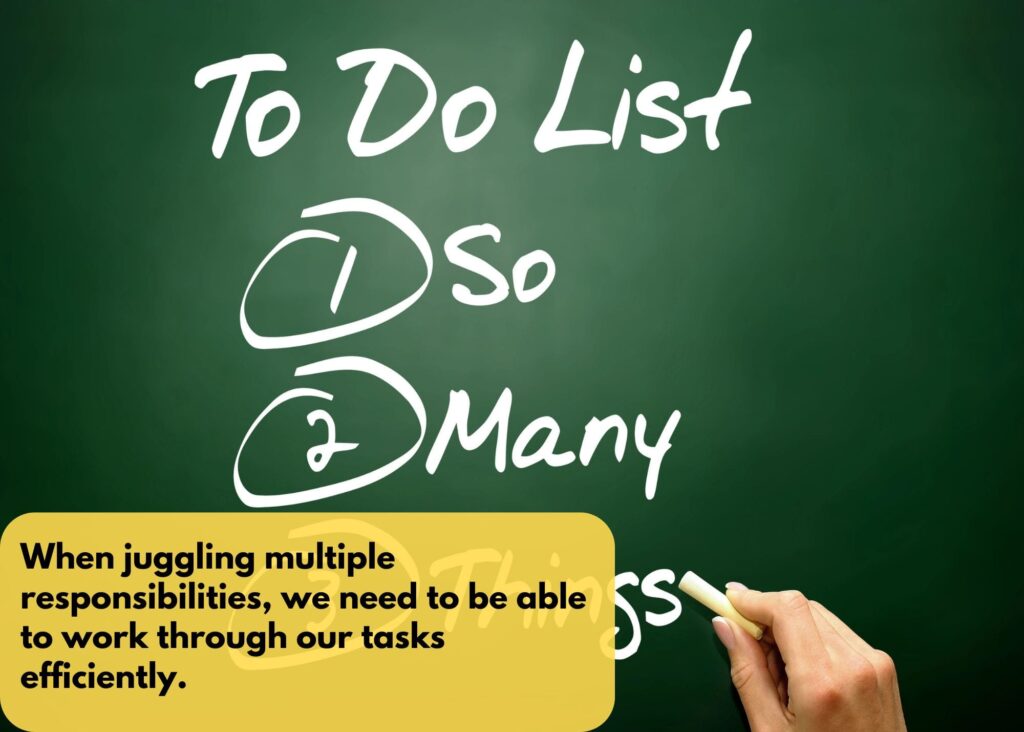You work full-time. You parent full-time. You side-hussle for extra income. Someday, you’d like to go back to school or start your own business.
But is it possible? Why do you constantly feel behind, your to-do list never finished?
When you have that much on your plate, time management will never be easy. However, good time management skills can help you prioritize, eliminate time-wasters, and accomplish the essentials.
At RaiseUp Families, we understand that in order to feed and care for your family and have leftover quality time to spend with them, you need good time management skills. That’s why we wrote this blog, to talk through some time management basics that will help you move past survival mode into a better life for you and your family.
Let’s get started!
Imagine you’re tasked with cleaning a large, dirty room. First, you sweep and mop the floor. Then you dust, but much of the dust falls on the floor, requiring you to sweep and mop again. Finally, you remove the bedding and curtains to wash them, which releases so much dust that you have to re-clean the whole room.
Although you worked hard, your inefficient system made the process much more difficult than it had to be.

It’s the same way in life. When juggling multiple responsibilities, we need to work through our tasks efficiently. Otherwise, we find ourselves working really hard, bouncing from one urgent task to another without accomplishing as much as we feel we should.
By taking time to pause, think through the system, and find ways to be more efficient, we can get ahead in life instead of just treading water in the same place, trying to survive.
This is likely not your first time trying to develop better time management skills. Maybe you’ve read a self-help book or bought a new planner, hoping it would completely change your life, only to find that you still struggle tremendously.
What happened?
Good time management is like a road to get you from point A to point B. It’s tremendously helpful—as long as the road is built on sound, well-compacted soil. A road built on unstable soil will wash out as soon as there’s a bad rainstorm, and the road will be useless.

Similarly, a great time management system will only work if you have some basic stability in your life. So before you worry about time management skills, focus on compacting that steady soil underneath by:
With this base of health and stability, you can build good time management habits. Over time, the two will reinforce each other—the more good time management you build, the more you’ll be able to stabilize your life, which will help you build more good time management skills.
But that basic stability has to come first.
How do you develop good time management? Where do you even begin?
List your priorities
One of the main issues with juggling many responsibilities is that it’s not always clear what you should be focusing on. Constantly trying to figure out what you should be doing right now can lead to decision fatigue.
To help you sort things out, start your time management journey by listing your priorities. By solidifying what matters most to you, you’ll have an easier time making decisions later. For example, if you prioritize putting food on the table first, quality time with your children second, and having money for school trips third, that will give you a metric to help you decide whether to work overtime one night.
Conduct an audit of your day
Next, spend some time conducting an audit of your typical day. Note when you get up, what tasks you do, how long those tasks take, and how much time you spend on your phone. (If your phone doesn’t have a screen time tracker, you might want to download one.)
This audit will give you the information you need to move forward.
Analyze your tasks according to the Eisenhower Matrix

President Dwight D Eisenhower once noted that he had two kinds of problems: the urgent and the important. Unfortunately, it was easy to spend all his time on unimportant, urgent tasks instead of important, non-urgent tasks.
This sentiment resonates with many of us. Perhaps you have an important task to accomplish, like applying to graduate school. But every day, there are so many urgent little tasks—helping your children find items they misplaced, remembering to take out the trash, dropping off library books before they’re due—that you never find the time to make your grad school dreams happen.
Stephen Covey, author of The 7 Habits of Highly Effective People, used this comment of Eisenhower’s to develop the Eisenhower Matrix. The Eisenhower Matrix has four quadrants:
By sorting your tasks into the Eisenhower Matrix, you’ll be able to manage your time better by eliminating time wasters and knowing how to prioritize your tasks.
Set SMART goals
As you identify tasks that are important but not urgent, it’s time to start setting goals to help you complete them.
In our blog post about setting financial goals, we outlined the SMART goal framework: SMART goals are Specific, Measurable, Achievable, Relevant, and Time-Bound. This framework applies to all goals, not just financial ones. Setting SMART goals will help you determine exactly what you need to do each day to accomplish your important tasks in a timely manner.
Start small and build habits
As you use the tools listed above to help structure your day, remember that the key to good time management is forming good habits. If you can plan ahead and execute your tasks in a specific order, you’ll free up time and brain space, making you more productive overall.
Instead of completely overhauling your current system, start with a few manageable changes and get into the habit of implementing them. The more habits you form, the easier it will be to add more good habits.
Get help and accountability

Finally, remember that you don’t have to do this alone! In fact, you’re much more likely to succeed if you get help. Here are some ways to get support in your time management journey:
Until now, we’ve given you general ideas for better time management rather than a step-by-step system to follow. That’s because your system will be unique to you, your schedule, and your brain.
That being said, here are some popular systems people employ for better time management.

Overall, there are many productivity systems to choose from, some of which you’ll find helpful and others you won’t. When working on your time management skills, the most important things are:
At RaiseUp Families, we know that when you’re experiencing financial hardship, providing a stable home and education for your children is challenging. Long-term goals like getting more education or starting your own business fall by the wayside as you struggle with day-to-day emergencies that arise.
That’s why it’s vital to learn good time management skills so you can schedule time to work on important, non-urgent tasks.
We’re here to support you on your journey. Whether through our Handup Program or referring you to other helpful resources, our goal is to see you and your family flourish.
If you have any questions about how we can help, don’t hesitate to email us!
